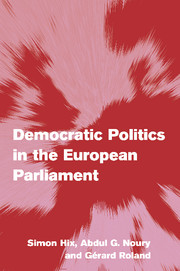Book contents
- Frontmatter
- List of Contents
- List of figures
- List of tables
- List of boxes
- Acknowledgements
- Introduction
- Chapter 1 Development of the European Parliament
- Chapter 2 Democracy, transaction costs and political parties
- Chapter 3 Ideological not territorial politics
- Chapter 4 Participation
- Chapter 5 Trends in party cohesion
- Chapter 6 Agenda-setting and cohesion
- Chapter 7 Who controls the MEPs?
- Chapter 8 Competition and coalition formation
- Chapter 9 Dimensions of politics
- Chapter 10 Investiture and censure of the Santer Commission
- Chapter 11 The Takeover Directive
- Conclusion
- Bibliography
- Index
Chapter 6 - Agenda-setting and cohesion
Published online by Cambridge University Press: 22 September 2009
- Frontmatter
- List of Contents
- List of figures
- List of tables
- List of boxes
- Acknowledgements
- Introduction
- Chapter 1 Development of the European Parliament
- Chapter 2 Democracy, transaction costs and political parties
- Chapter 3 Ideological not territorial politics
- Chapter 4 Participation
- Chapter 5 Trends in party cohesion
- Chapter 6 Agenda-setting and cohesion
- Chapter 7 Who controls the MEPs?
- Chapter 8 Competition and coalition formation
- Chapter 9 Dimensions of politics
- Chapter 10 Investiture and censure of the Santer Commission
- Chapter 11 The Takeover Directive
- Conclusion
- Bibliography
- Index
Summary
In the previous chapter we discussed long-term trends in party cohesion and found that increased powers to the European Parliament had led to increased cohesion of parties. Here we focus on the short-run determinants of cohesion and look at the characteristics of particular votes: how important they are, who sets the agenda and for what purpose, and so on.
As discussed in the previous chapter, there are several competing explanations of why parliamentary parties are cohesive. If the members of the party share the same preferences over policy, then on most issues these members will vote together naturally, without the need for any additional pressure or incentives from the party leadership. We found evidence that, despite increased ideological diversity (as a result of expansion of most of the groups to new parties from the existing member states and new member states), voting cohesion has increased and not decreased, suggesting that preferences alone cannot explain cohesion. We presented evidence that suggests that the explanation of cohesion based on the idea that the members of the political groups in the European Parliament have homogeneous a priori preferences does not hold. We showed, for example, that growing internal ideological diversity in the political groups had no negative effect on the cohesion of the groups.
Figure 6.1 illustrates the difference between policy preferences of MEPs and their voting behaviour.
- Type
- Chapter
- Information
- Democratic Politics in the European Parliament , pp. 105 - 131Publisher: Cambridge University PressPrint publication year: 2007



